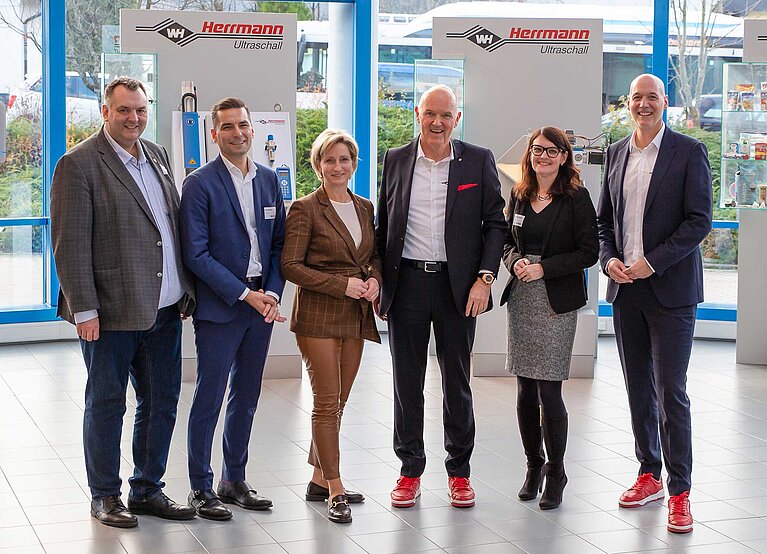04. December 2024
, News
EU regulations as catalyst for transformation


During a visit to machine manufacturer Herrmann Ultraschall on 27 November, Dr Nicole Hoffmeister-Kraut, Minister for Economic Affairs in the German state of Baden-Württemberg, was able to see firsthand how a local hidden champion is implementing the EU's sustainability guidelines with the help of ultrasonic welding technology.
Joining plastics or metals with minimal energy: To implement the requirements of the EU Green Deal or the European Packaging Directive PPWR, ultrasonic welding is essential in many industries as a particularly environmentally friendly process. The visit of Minister of Economic Affairs Dr. Nicole Hoffmeister-Kraut and Member of the German Bundestag Nicolas Zippelius to technology company Herrmann Ultraschall focused on the role of politics in accelerating the sustainable transformation of key industries in Germany's Baden-Württemberg region.
“As Minister of Economic Affairs for Baden-Württemberg, it makes me proud to have innovative companies like Herrmann Ultraschall, which stands out for its advanced and sustainable production techniques and also covers the entire value chain from development to production, in our state. This means that the company is 100 percent 'Made in BW'. Herrmann Ultraschall not only contributes significantly to the local economy and the creation of high-quality jobs, but also sets a strong example for the region,” said Dr. Nicole Hoffmeister-Kraut, Minister for Economic Affairs, Labor and Tourism. From a technical point of view, the insights into ultrasonic welding were also very interesting. This technology is a particularly environmentally friendly process with broad relevance, also considering the requirements of the EU Green Deal. It's amazing how many things we touch every day that have been manufactured using this technology,” the minister continued.
Thomas Herrmann, CEO of Herrmann Ultraschall, also emphasized the importance of a joint exchange: “We are proud that our technology is helping to strengthen the competitiveness of industry in the state. But we need the support of policymakers to continue to respond proactively and quickly to market developments.” Only with additional resources and a strong network within industry can Baden-Württemberg hold its own against the competition from China and the USA in the long term and thus maintain value creation at the location, he added.
To demonstrate the versatile use of ultrasonic welding technology, the representatives of the Ministry of Economic Affairs were given a tour of the four ultrasonic laboratories of Herrmann Ultraschall. This is where application engineers develop welding solutions for the automotive, hygiene and packaging industries, for example. The entire value chain, from development to production, takes place in the German Headquarters in Karlsbad and is therefore 100 percent “Made in Baden-Württemberg”.